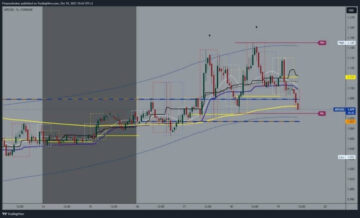In a significant development, the Biden administration is set to announce new sanctions on Russia, with a primary focus on its oil exports. These sanctions are a direct response to the reports that Russian crude oil has been consistently selling at a substantial premium to the G7 price cap of $60 per barrel. The move underscores the White House’s commitment to maintaining control over global oil prices and ensuring a level playing field in the energy market.
The Dark Fleet: Sanctioning Russian Oil Exports
The target of these new sanctions will be what is often referred to as the “dark fleet” of tankers responsible for transporting Russian crude oil worldwide. The exact details of these sanctions have not been disclosed, but it is clear that they have been in development for several months. This marks a significant shift in the U.S. government’s approach to addressing the issue of oil pricing and exports, especially concerning Russia.

Challenges to the G7 Price Cap
The Group of Seven (G7) and the European Union had previously reached an agreement to cap the price of Russian oil when transported on Western-registered vessels and insured by Western insurers at $60 per barrel. However, over the past few months, there have been consistent reports suggesting that Russian crude oil was being sold at prices exceeding this cap. This discrepancy between the price cap and the actual market prices prompted the Biden administration to take action.
With the recent surge in oil prices, the gap between the G7 price cap and the actual prices at which Russia was selling its oil widened significantly. This development has raised concerns about the efficacy of the cap in curbing Russia’s oil revenues.
Improving Enforcement of Sanctions
Treasury Secretary Janet Yellen acknowledged the challenges related to enforcing the price cap, stating that the U.S. government is closely monitoring the situation. She emphasized the need to ensure that market participants are fully aware of the seriousness of adhering to the price cap, particularly when Western services are involved.
While Secretary Yellen did not provide specific details on how the enforcement of sanctions would be enhanced, she pointed out that Russian oil revenues had already seen a notable decline over the past ten months due to the price cap. Recent data indicates that a barrel of Urals crude oil was sold for $85 per barrel in September. Although the price has since dropped to $75, it still remains well above the G7’s $60 price cap.
Biden Administration Takes Bold Action to Regulate Russian Oil Exports
The imposition of new sanctions on Russian oil exports is a crucial step taken by the White House to address the challenges posed by Russia’s consistent pricing of its crude oil above the G7 cap. These sanctions target the “dark fleet” responsible for transporting Russian oil around the world, highlighting the Biden administration’s commitment to leveling the playing field in the global oil market.
As the enforcement of these sanctions is set to be enhanced, the effectiveness of the G7 price cap will be closely monitored. While Russian oil revenues have seen a decline, the persistently high prices at which it is being sold indicate that more robust measures are needed. The Biden administration is committed to ensuring that the price cap is strictly adhered to, and these sanctions are a clear message to market participants that compliance is essential.
- SEO Powered Content & PR Distribution. Get Amplified Today.
- PlatoData.Network Vertical Generative Ai. Empower Yourself. Access Here.
- PlatoAiStream. Web3 Intelligence. Knowledge Amplified. Access Here.
- PlatoESG. Carbon, CleanTech, Energy, Environment, Solar, Waste Management. Access Here.
- PlatoHealth. Biotech and Clinical Trials Intelligence. Access Here.
- Source: https://www.financebrokerage.com/the-implications-of-new-sanctions-on-russian-oil-exports/
- :has
- :is
- :not
- a
- About
- above
- acknowledged
- Action
- actual
- address
- addressing
- adhered
- adhering
- administration
- Agreement
- already
- Although
- an
- and
- Announce
- approach
- ARE
- around
- AS
- At
- aware
- BE
- been
- being
- between
- biden
- Biden Administration
- bold
- but
- by
- cap
- challenges
- clear
- closely
- commitment
- committed
- compliance
- concerning
- Concerns
- consistent
- consistently
- control
- crucial
- crude
- Crude oil
- curbing
- Dark
- data
- Decline
- details
- Development
- DID
- direct
- discrepancy
- dropped
- due
- effectiveness
- efficacy
- emphasized
- energy
- Energy Market
- enforcement
- enforcing
- enhanced
- ensure
- ensuring
- especially
- essential
- Ether (ETH)
- European
- european union
- exports
- few
- field
- FLEET
- Focus
- For
- fully
- G7
- gap
- Global
- Government
- Group
- had
- Have
- High
- highlighting
- House
- How
- However
- HTTPS
- implications
- in
- indicate
- indicates
- insurers
- involved
- issue
- IT
- ITS
- jpg
- Level
- maintaining
- Market
- Market Prices
- measures
- message
- monitored
- monitoring
- months
- more
- move
- Need
- needed
- New
- notable
- of
- often
- Oil
- on
- out
- over
- participants
- particularly
- past
- per
- persistently
- plato
- Plato Data Intelligence
- PlatoData
- playing
- posed
- Premium
- previously
- price
- Prices
- pricing
- primary
- provide
- raised
- reached
- recent
- referred
- Regulate
- related
- remains
- Reports
- response
- responsible
- revenues
- robust
- Russia
- russian
- Russian oil
- s
- Sanctions
- secretary
- seen
- Selling
- September
- Services
- set
- seven
- several
- she
- shift
- significant
- significantly
- since
- situation
- sold
- specific
- stating
- Step
- Still
- substantial
- surge
- Take
- taken
- takes
- Target
- ten
- that
- The
- the world
- There.
- These
- they
- this
- to
- transported
- transporting
- u.s.
- U.S. government
- underscores
- union
- vessels
- was
- webp
- WELL
- Western
- What
- What is
- when
- which
- while
- white
- White House
- will
- with
- world
- worldwide
- would
- yellen
- zephyrnet











